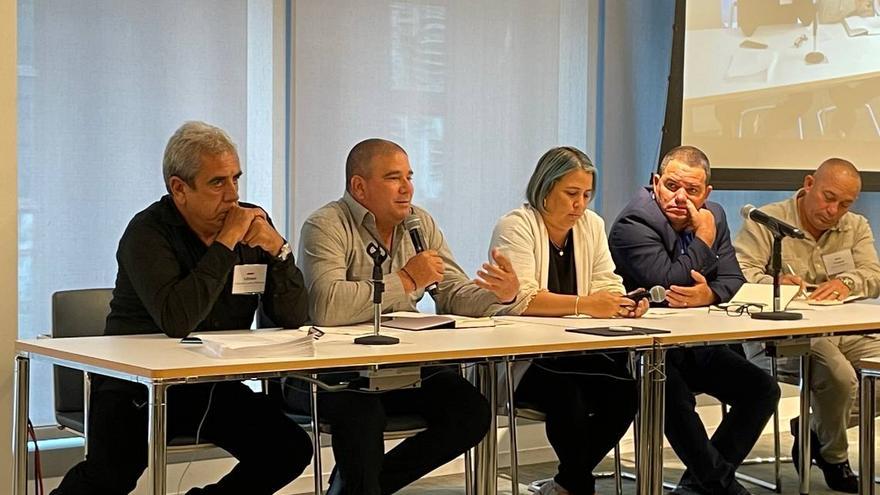
![]() 14ymedio, Madrid, 26 September 2023 — About 70 businesspeople living on the Island have been attending an event in Miami this Monday, sponsored by Cuban-Americans who are trying to give wings to the private sector in Cuba, according to El Nuevo Herald on Tuesday. Both the trip and the seminar are organized by a law firm, Akerman, and the opening of the event was carried out by the former mayor of Hialeah, Raúl Martínez.
14ymedio, Madrid, 26 September 2023 — About 70 businesspeople living on the Island have been attending an event in Miami this Monday, sponsored by Cuban-Americans who are trying to give wings to the private sector in Cuba, according to El Nuevo Herald on Tuesday. Both the trip and the seminar are organized by a law firm, Akerman, and the opening of the event was carried out by the former mayor of Hialeah, Raúl Martínez.
“The Cuban-American community believes that an essential part of a future democratic and prosperous Cuba includes a system of free enterprise,” said former Democratic congressman for Florida Joe García, who, in November 2022, had a controversial meeting with Miguel Díaz-Canel himself during a trip to the Island, made with the aim of opening cooperation between Florida and the Island through the MSMEs (micro, small and medium-sized enterprises).
The purpose of the meeting, its promoters say, “is to demonstrate that these companies are real and not a facade of the Cuban Government, as their critics in Miami have said.” So much so, that billionaire Mike Fernández, a health sector entrepreneur, asked ironically: “How many State Security agents are there in the room?” After the joke, he went on to give recommendations on how to succeed in the United States and circumvent the restrictions of the embargo.
The purpose of the meeting, its promoters say, “is to demonstrate that these companies are real and not a facade of the Cuban Government, as their critics in Miami have said
“It is the beginning of something monumental that will change [the country]. If Cuba doesn’t receive aid from another country, it will continue to go backwards,” he warned. The rumor is circulating that Joe Biden’s government could facilitate the process for these private entrepreneurs by allowing them to open bank accounts in the U.S. or by providing credits.
Among the guests was Hugo Cancio, one of the most controversial businesspeople for the Cuban exile, which accuses him of profiting by doing business with the regime. “That Cuban businesspeople from both sides of the Florida Strait meet, exchange, collaborate and explore joint opportunities in Miami not only is historic, but it also is the future. At Katapulk we already collaborate with many of the MSMEs present here. Now we are also exploring investment opportunities and partnerships,” he told the Herald.
Ariel Pereda, who sold food to the state-owned Alimport and now exports to the private sector, also participated. He is less optimistic and more suspicious – the changes are going to “take time,” he said – but he is enthusiastic about “the volume, the level of activity, the inventiveness of the private sector and its persistence.”
Among those who traveled to Miami were many who did so for the first time, according to the article, which highlights the diversity of areas of the companies involved: transport, construction, software development and clothing, among others. Among the success stories, it cites a company from Villa Clara, D’Cabellos, which has its plant in Camajuaní and is dedicated to hygiene and beauty products. According to the press kit they took to the United States, since January 2022 they have sold goods worth 2.2 million dollars.
The attendees agreed that the current moment of crisis can overcome the resistance of both sides. “The Cuban State is bankrupt,” said Aldo Álvarez, owner of Mercatoria, a company that imports “large quantities” of wheat, chicken and cooking oil to sell on the Island.
“I feel super hopeful with all these measures that President Biden is announcing; the news about bank accounts is wonderful,” said another entrepreneur in the tourism sector. “We are not asking for money, loans or credits; we are asking for the possibility of conducting negotiations independently without people having to mediate.”
“Of course, the [Cuban] Government can destroy it tomorrow if it wanted to, in the same way that our [US] regulations could destroy it as well”
Joe García put the governments of the U.S. and Cuba on the same level when he demanded to take advantage of a good moment that could change. “Of course, the [Cuban] Government can destroy it tomorrow if it wanted to, in the same way that our [US] regulations could also destroy it, because the United States is the most natural market to do business with Cuba,” he said.
Among the issues that most interested the owners of the MSMEs were the efforts to reduce the costs of intermediaries and a market that does not push them towards resellers. Many things are still forbidden.
Some also asked if it is possible to open a company in the United States to sell or buy inputs, but the answer was negative, due to the restrictions of the embargo. For other reasons, the same thing happens in Cuba, where a person cannot have a company unless they are a resident of the Island. However, that could change, some warned, if the plan outlined by Miguel Díaz-Canel in his meeting in New York with businesspeople he spoke to about “transformations (…) to facilitate the investments of Cuban Americans and let them be owners of MSMEs registered in Cuba” comes to fruition.
Translated by Regina Anavy
____________
COLLABORATE WITH OUR WORK: The 14ymedio team is committed to practicing serious journalism that reflects Cuba’s reality in all its depth. Thank you for joining us on this long journey. We invite you to continue supporting us by becoming a member of 14ymedio now. Together we can continue transforming journalism in Cuba.
